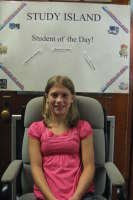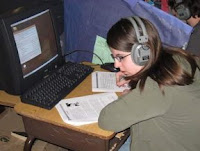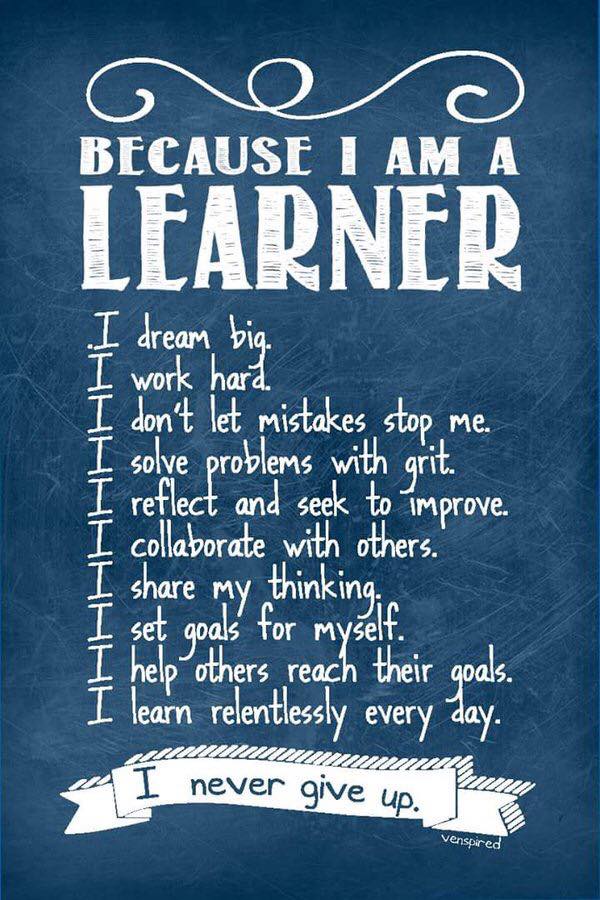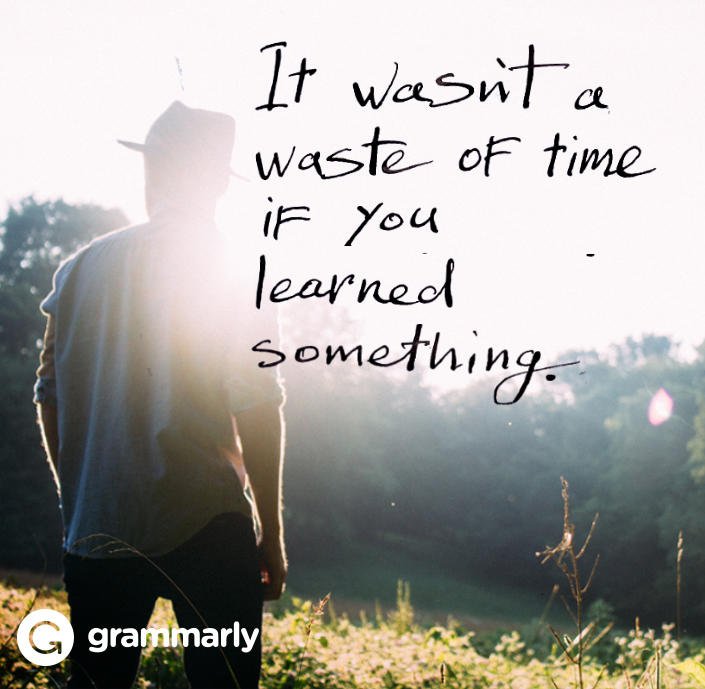Showing posts with label learning. Show all posts
Showing posts with label learning. Show all posts
Monday, February 25, 2019
Wednesday, September 27, 2017
Tuesday, August 29, 2017
Tuesday, April 21, 2015
Tuesday, November 29, 2011
Hey Students, Don't Hide
Even though you think you are hidden, I see you. Don't be like this gecko, feeling like he can't be seen. When we have class discussions, you may not raise your hand. You may not look up. You may stare at the floor, hoping not to be noticed. But everyone knows you are here.
Maybe you are afraid your answer will be wrong. Maybe you are afraid someone will laugh at your opinion or think you are dumb. Maybe you are just quiet by nature.
Please do me a favor. Take a chance. Speak out. Raise your hand. Share your thoughts and opinions. Everyone will benefit by your participation. Classmates will learn from hearing your ideas. And you will learn more, too.
Image from Lorenzo Menendez/Nature/National Geographic Photo Contest
Labels:
Class Discussion,
Education,
effort,
learning,
Reading Workshop
Friday, September 30, 2011
Better Listen and Listen Fast
Better pay attention! Why you ask? Because this isn't a teacher standing in front of the class and talking all day blah, blah, blah, blah, blah kind of class.
Have a look at this.
Now I am not going to teach quite like that (I hope) and I am not going to talk all day. This is a class with a five minute mini-lesson, and then students work hard and then work some more. As famous California educator, Dr. Harry K. Wong said, "the one doing the work is the one doing the learning." And of course, I want students to learn as much as is possible.
Please give me your attention. I'll keep it short.
Monday, February 16, 2009
What Makes a Good Teacher #2
 In a previous post, I discussed What Makes a Good Teacher. There was an overwhelming response with many interesting comments, and opinions on this blog, and several others. With this in mind, and help from well-thought out suggestions, here is another look at what makes a good teacher.
In a previous post, I discussed What Makes a Good Teacher. There was an overwhelming response with many interesting comments, and opinions on this blog, and several others. With this in mind, and help from well-thought out suggestions, here is another look at what makes a good teacher.1. Knowledge of Content
Effective teaching demands that the teacher be knowledgeable in the subject area. The teacher must have a detailed understanding of what it being taught. This includes an understanding of the entire course of study and how concepts should build upon each other throughout the students' education.
2. Mastery of a Variety of Instructional Techniques
No two classes, or two indicators are identical. An effective teacher understands this and differs instruction based on what will assist the most students be the most successful. Key concepts are presented in ways to enable visual, auditory, and kinesthetic learners grasp it.
3. Dedicated to the Craft
The best teachers spend their entire career improving their ability to teach. They read and explore the techniques used by others in a never-ending effort to better themselves and their skill. The see teaching as a lifelong journey of continual drive to improve instruction.
4. Effective Classroom Manager
Discipline is not an issue. Students understand class rules and expectations, and adhere to them. When discipline is necessary, it is not vindictive, but just a consequence when a student does not do what is required.
5. Individualized Instruction and Approaches to Students
Every student is different, and at times their needs reflect this. To effectively teach all students, the teacher must understand this. The teaching and interactions with students must reflect the needs of each, with the understanding of each as an individuals.
6. Highest Expectation For the School, Teachers and Students
Only the best is good enough. Quality is expected, and nothing less is acceptable. Passion for excellence is a driving force each and every day. A good teacher makes the school better by being a part of it. He pushes himself to be the best. Failure is not an option for the teacher or the students.
As I stated in the previous post, I would never claim to do all of the things in this list. All I can hope is that I spend each day trying to live up to these ideas. Writing a post like this is the easy part, living up to it is every teacher's challenge.
*
Labels:
Education,
Excellence,
Hard Work,
learning,
Motivation,
Reading Workshop,
Teachers
Wednesday, December 17, 2008
Paulsen--Read Aloud, Reminiscing, and Rethinking
 I read aloud the first chapter of Woodsong today. Gary Paulsen describes a scene running a team of sled dogs. He talks about the beauty of a sparkling sunny, but cold day. His dog team was working in tandem and everything was wonderful. Then a doe busts over his lead dog, and onto a mostly frozen lake as she was being chased by a pack of coyotes. The scene turns from one of unbelievable beauty to unbelievable horror. And this led to Paulson questioning his thoughts and ideas about nature.
I read aloud the first chapter of Woodsong today. Gary Paulsen describes a scene running a team of sled dogs. He talks about the beauty of a sparkling sunny, but cold day. His dog team was working in tandem and everything was wonderful. Then a doe busts over his lead dog, and onto a mostly frozen lake as she was being chased by a pack of coyotes. The scene turns from one of unbelievable beauty to unbelievable horror. And this led to Paulson questioning his thoughts and ideas about nature.Later, as I thought about how students responded to this story, it caused me to reminisce about meeting Gary Paulsen. Much in the same manner as the first chapter of Woodsong, he comes across first as this kindly, little old man. Then as he begins to tell his stories, you realize that maybe you don't quite know him.
As each story unfolds, you begin to realize that the more you listen, the less you understand. Obviously the tales from his childhood that forced a premature self-reliance also impacted him in other ways. His love of nature, at first as an escape, and later for the wonderment, always shows through.
Talking to him though, quickly forces a reevaluation of all of the preconceived notions based on reading blurbs and enjoying his books. This is a rough, tough, crude, man's man. This is someone who can stand tall in any crowd, but doesn't care. He has lived his life based on his decisions.
He doesn't write of the horror he witnessed that day by the lake to amaze his audience. He does so to share his feelings and help the reader understand his journeys. I am sure his goal is to write in a way that will cause the reader to think and reevaluate what he thinks he knows. And hopefully the students today did just that.
Several students said they didn't like this book as a read aloud. They wanted me to switch to a happier book. But I am going to read some more. At least then, maybe they will understand how a master writer shocked them, to make them think and make them learn.
*
*
Labels:
Laurelville students,
learning,
Paulsen,
Read Aloud,
Reading Workshop,
Woodsong
Wednesday, September 17, 2008
Using a Dictionary & Other Tools
The Head Monkey from Canada posted this as a comment, but I thought maybe it should be posted.
Okay, Ohio Monkeys, how about this one?? I just gave my Canadian Monkeys a vocabulary test today to see where their strengths and weakness are (Gates-MacGinitie). Should I have let them use a dictionary???
To add to this thought, when is it OK to use all of the tools available? When should students show what they know without the help of tools like dictionaries, thesaurus, word processing and other technology, peer help, teacher help . . .?
Okay, Ohio Monkeys, how about this one?? I just gave my Canadian Monkeys a vocabulary test today to see where their strengths and weakness are (Gates-MacGinitie). Should I have let them use a dictionary???
To add to this thought, when is it OK to use all of the tools available? When should students show what they know without the help of tools like dictionaries, thesaurus, word processing and other technology, peer help, teacher help . . .?
Labels:
Dictionary,
Head Monkey,
learning,
method,
technology,
Thesaurus
Tuesday, September 9, 2008
Are You on the Road to Smarter?

I had an interesting conversation with a student yesterday. We were talking about being smart or being dumb. Is it a choice? It seems to me if you make smart choices in school, you will learn and become smarter. If you make dumb choices like not doing your work, not studying, and don't learn, you won't get any smarter.
What do you think? Will making smart choices as a student make a smarter adult? Can you control how smart you are? How much does hard work and responsibility have to do with getting to Smarter. Or, do you just get so much brain power and that is it?
Can you choose the road to Smarter? If you don't choose, do you crash into Dumberville?
What about when you choose the right road, you are getting smarter, and then this happens?

Have you mapped out your road to success? Where are you headed? Do you have a goal of someday living in Smarter? It may just be a rumor, but I heard that the people in Smarter have better jobs, make more money, have nicer houses, and drive newer cars. Anyone know if this is true?
Sunday, September 7, 2008
Is Surfing the Net Reading?
 "She does spend hours on the internet every day. I would say that this would be the internet generations way of reading," said Shasta Goode.
"She does spend hours on the internet every day. I would say that this would be the internet generations way of reading," said Shasta Goode.Thank you for this thought provoking comment that was posted on the Reading Post.
So readers, here are a few questions:
1. Is surfing the net the same as reading a book? How is it alike? Different?
2. Is reading a magazine the same as surfing the net? Reading a book?
3. Is reading nonfiction material posted on the internet a more valuable skill for students as more and more information is digital?
4. Are there different skills needed to read web pages v. reading printed material?

Thanks to S.G. for contributing to the blog with her comment.
Labels:
Comments,
Internet,
learning,
Nonfiction,
Parents,
Reading,
success,
technology
Thursday, September 4, 2008
Study Island
Students work daily in reading with the online learning program from Study Island. This program is based on the Ohio State Standards. It has lessons that help teach each topic a nd remediates when students do not pass a topic. Students can do sessions anywhere they have internet access.
nd remediates when students do not pass a topic. Students can do sessions anywhere they have internet access.
Each day a Study Island Student of the Day is chosen from each class. The winners receive an award certificate, a piece of candy,


You can tell by looking at Briann, that when a student gets "The Chair" they spend a day in class living in luxury!
Congratulations to today's Study Island Students of the Day--Breann C., Samantha R., and Jolene M.
 nd remediates when students do not pass a topic. Students can do sessions anywhere they have internet access.
nd remediates when students do not pass a topic. Students can do sessions anywhere they have internet access.Each day a Study Island Student of the Day is chosen from each class. The winners receive an award certificate, a piece of candy,
AND THEY GET THE CHAIR FOR THE DAY!


You can tell by looking at Briann, that when a student gets "The Chair" they spend a day in class living in luxury!
Congratulations to today's Study Island Students of the Day--Breann C., Samantha R., and Jolene M.
Labels:
learning,
ODE,
On-line Learning,
Student of the Day,
Study Island,
technology
Tuesday, August 26, 2008
Conversation with a Parent
Last night, at Open House a parent came up and asked about the blog. She said, "we bought a new computer so we could get on the blog. Our old computer didn't work that well, and we wanted to be sure that we could always get on."
I doubt if she could even imagine how her comment, and her commitment to her son's education affected me. She has my respect for her effort to be involved with her child, and help make him successful.
As the writer of the blog, I am humbled. I appreciate the time that parents, students, teachers, and friends take to read it. I am thankful for the effort students and parents put forth in reading and commenting. I also feel responsible for making this worthwhile for the reader.
As I drove home last night, I thought about what a great feeling this parent gave to me to start the year. Thank you!
I doubt if she could even imagine how her comment, and her commitment to her son's education affected me. She has my respect for her effort to be involved with her child, and help make him successful.
As the writer of the blog, I am humbled. I appreciate the time that parents, students, teachers, and friends take to read it. I am thankful for the effort students and parents put forth in reading and commenting. I also feel responsible for making this worthwhile for the reader.
As I drove home last night, I thought about what a great feeling this parent gave to me to start the year. Thank you!
Labels:
blog,
Education,
first week,
learning,
Parents,
Reading Workshop,
Responsibility,
Thank you
Tuesday, May 6, 2008
Two Person Journal
 One journal, one topic, one file, but two writers make a Two Person Journal. Students were partnered with a peer from another class. A folder with a file was created on the Laurelville server. The page was divided down the middle using a two column table. For the rest of the school year, students will write each day about a different topic.
One journal, one topic, one file, but two writers make a Two Person Journal. Students were partnered with a peer from another class. A folder with a file was created on the Laurelville server. The page was divided down the middle using a two column table. For the rest of the school year, students will write each day about a different topic.This system has an advantage over a regular journal in that the writer has an audience. Everything written will be read daily. Also, with a peer to share ideas, comments, opinions, and information, it means more. Whether students write about books, school, friends, hobbies, family, or any other topic, they know a reader cares about what they have to say.
I originally did this project with composition notebooks that students shared. Now, with the technology available in Reading Workshop, students keep a common Open Office Word file saved on our file server. They can each write to the file from anywhere in the school. Because there is a computer for each student, they can access their file during class each day, read their partner's post, and respond.
This is a great motivator for students. After all, what does every writer want? To be read, of course.
Monday, May 5, 2008
Role of Technology in Education
I first viewed this on Betchablog.
Parents, students, and teachers, how should technology be incorporated into education? What would the ideal Reading Workshop look like? What would reading and writing instruction look like? What processes would we follow? What activities would take place in this "ideal" classroom? What would determine success?
Parents, students, and teachers, how should technology be incorporated into education? What would the ideal Reading Workshop look like? What would reading and writing instruction look like? What processes would we follow? What activities would take place in this "ideal" classroom? What would determine success?
Labels:
Education,
LA Workshop,
learning,
method,
Reading Workshop,
Teachers,
technology
Friday, May 2, 2008
Learning Styles
What kind of learner are you? North Carolina State University has a test you can take to find out how you learn best.
Just follow the link, take the test, and then print out the results.
Felder and Soloman, researchers for NCSU look at four areas of learners in their report of Learning Styles and Strategies. Listed below is a breakdown of the areas.
Active and Reflective Learners
Active learners tend to retain and understand information best by doing something active with it--discussing or applying it or explaining it to others.
Reflective learners prefer to think about it quietly first.
Sensing and Intuitive Learners
Sensing learners tend to like learning facts, intuitive learners often prefer discovering possibilities and relationships. Sensors often like solving problems by well-established methods and dislike surprises.
Intuitors may be better at grasping new concepts. Intuitors tend to work faster and to be more innovative.
Visual and Verbal Learners
Visual learners remember best what they see--pictures, diagrams, flow charts, time lines, films, and demonstrations.
Verbal learners get more out of words--written and spoken explanations.
Sequential and Global Learners
Sequential learners tend to gain understanding in steps, with each step following logically from the previous one.
Global learners tend to learn in large jumps. Global learners may be able to solve complex problems quickly or put things together once they have grasped the big picture.
My Results
The chart below shows the results from my test. As you can see, I am strongly an intuitive, global learner, with a tilt towards visual learning. Basically, this means I tend to work quickly, always looking for new ideas, and need to see the whole concept. I need to picture an idea to understand it.

What is your learning style? What does this tell you about how you learn best?
Just follow the link, take the test, and then print out the results.
Felder and Soloman, researchers for NCSU look at four areas of learners in their report of Learning Styles and Strategies. Listed below is a breakdown of the areas.
Active and Reflective Learners
Active learners tend to retain and understand information best by doing something active with it--discussing or applying it or explaining it to others.
Reflective learners prefer to think about it quietly first.
Sensing and Intuitive Learners
Sensing learners tend to like learning facts, intuitive learners often prefer discovering possibilities and relationships. Sensors often like solving problems by well-established methods and dislike surprises.
Intuitors may be better at grasping new concepts. Intuitors tend to work faster and to be more innovative.
Visual and Verbal Learners
Visual learners remember best what they see--pictures, diagrams, flow charts, time lines, films, and demonstrations.
Verbal learners get more out of words--written and spoken explanations.
Sequential and Global Learners
Sequential learners tend to gain understanding in steps, with each step following logically from the previous one.
Global learners tend to learn in large jumps. Global learners may be able to solve complex problems quickly or put things together once they have grasped the big picture.
My Results
The chart below shows the results from my test. As you can see, I am strongly an intuitive, global learner, with a tilt towards visual learning. Basically, this means I tend to work quickly, always looking for new ideas, and need to see the whole concept. I need to picture an idea to understand it.

What is your learning style? What does this tell you about how you learn best?
Labels:
Laurelville students,
learning,
Learning Styles,
method,
Survey
Why Blog?
Why? Why? Why?
Labels:
attitude,
blog,
Extra Credit,
Hard Work,
LA Workshop,
Laurelville students,
learning
Wednesday, April 30, 2008
New School
 Will we ever get a new school? Do we need one? Would it improve the quality of education for Logan Elm students? I was reading the Blue Skunk Blog when I saw this picture. It just made me sit and daydream about seeing a sign like this on S.R. 56.
Will we ever get a new school? Do we need one? Would it improve the quality of education for Logan Elm students? I was reading the Blue Skunk Blog when I saw this picture. It just made me sit and daydream about seeing a sign like this on S.R. 56.As the Logan Elm Local School District searches for a new superintendent, the leading candidate, Mrs. Jan Broughton, current superintendent, Portsmouth City Schools, helped her current district achieve this. Logan Elm currently ranks 371 out of 612 districts by the Ohio School Facility Commission for matching state funds. Most of the schools up through the first 300 either already have new schools, or are in the process. We will soon be eligible.
Almost every district in our area has new buildings. You will see new buildings if you drive by Amanda, Southeastern, Adena, Huntington, Teays Valley, Canal Winchester, Logan Hocking, Unioto, Westfall, and many others.
Are our one hundred year old building good enough? Do we need air conditioning? Would it help if classrooms were bigger, so students would have more room? Would Laurelville Elementary students learn more in a new setting? Would more students succeed?
Labels:
Laurelville students,
learning,
Logan Elm,
New school,
success
Monday, April 21, 2008
Listen While You Work

"You can put on your headphones, play a CD, and listen to music as you work." Students almost fell out of their seats when I told them they could start doing this on Monday. They had never heard of anything like this. First it was singing in the class. Now, we are experimenting with this in language arts. Due to the fact that each students has his/her own computer, each has a CD ROM at their desk.
There are a few rules:
1. You put a CD in the computer at the start of class, and leave it for the entire class.
2. You cannot play it loud, or bother peers.
3. Once you hit play, you must work.

There are several benefits when students play background music while they study, read, or write:
1. increase attention levels
2. improve retention and memory
3. extend focused learning time
4. expand thinking skills
In the brain there is a band of white fibers connecting the right and left halves of the cerebrum called the corpus callosum. Very recently researchers have discovered that the corpus callosum increases in size when humans are exposed to music. This increases communication between the two halves of the brain which increases learning efficiency.
Yiftach Levy of the Department of Educational Technology at San Diego State University studied the use of background music in the classroom. This is part of his finding.
Davidson and Powell (1986) took up this exact subject in their study of American fifth-grade science students. They reported the observations of on-task-performance (OTP) of children in the classroom over 42 class sessions, with data recorded every three minutes (10 times) per session. Treatment, in the form of easy-listening music, was delivered in between two control observations (i.e., 15 sessions without background music, 15 with, and 12 without, in that order). They determined a significant increase in OTP for the males in the classroom, and for the class as a whole.
You can read the entire report HERE.
Students have the opportunity to listen to music as they work. How will they respond?
Labels:
LA Workshop,
learning,
Motivation,
singing
Wednesday, April 2, 2008
Do You Get the Question?
This week, we are focusing on questions. Students are not even getting to see the passage that a question goes with, but they are expected to begin their answer. Sound impossible? Well, it is difficult but our students are proving they can do it.
Last week, Mrs. Stevenson, Mrs. Caudill and I scored the practice run of the Ohio Achievement Test that students took on March 18. Students did well, especially on the multiple choice questions. As we scored the tests, the amount of effort students put forth, clearly showed.
One area that I noticed as an overall weakness, was in setting up short answer and extended response answers in a way that would make 2 or 4 points easy to attain. With this in mind, our instruction for the next two weeks, will focus on using the question to set up the best answer possible. This will help students as they take the Achievement Test, and even more important, as they move up through jr. and sr. high school.
Each day, students receive a paper with one or two questions. They must set up their answer, without being able to use the selection as a resource. Below is a typical question, and the beginning of an answer by Trevor S.

Last week, Mrs. Stevenson, Mrs. Caudill and I scored the practice run of the Ohio Achievement Test that students took on March 18. Students did well, especially on the multiple choice questions. As we scored the tests, the amount of effort students put forth, clearly showed.
One area that I noticed as an overall weakness, was in setting up short answer and extended response answers in a way that would make 2 or 4 points easy to attain. With this in mind, our instruction for the next two weeks, will focus on using the question to set up the best answer possible. This will help students as they take the Achievement Test, and even more important, as they move up through jr. and sr. high school.
Each day, students receive a paper with one or two questions. They must set up their answer, without being able to use the selection as a resource. Below is a typical question, and the beginning of an answer by Trevor S.

Labels:
Achievement Test,
Answering Questions,
Hard Work,
LA Workshop,
learning
Subscribe to:
Posts (Atom)









